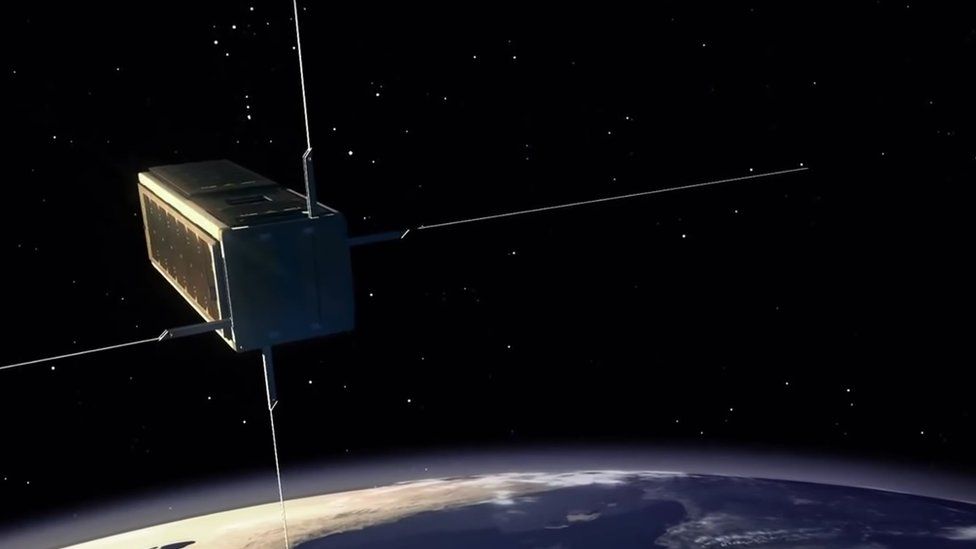Scottish space industry soaring high
- Published

The Scottish space industry is big - and growing.
While Scotland makes up less than 9% of the UK population it accounts for 18% of jobs in the UK space industry.
More than 100 private and public organisations have created almost 7,000 jobs and are contributing more than £130m to the Scottish economy
In the last two years Glasgow has built more satellites than any other city in Europe.
The news comes as the city prepares to host a conference on how to use the increasing amount of data coming from orbit.
So why does Scotland punch above its weight?
Strathclyde University space engineering expert Dr Malcolm Macdonald credits Scotland's longstanding strength in engineering, science and technology.
"It's always something we've been good at," he says.
In the satellite sector Scotland has grown big by thinking small.
The satellites that grab the headlines tend to be big, heavy and expensive. They can also take years to design and build.
There will always be a place for such spacecraft. You couldn't watch satellite TV or use your satnav without them.
But the development of the CubeSat has led to what is virtually a new industry.
The CubeSat began as an idea from two professors in California: a 10cm cube in space; a litre of science in Earth orbit.
Not as powerful as the big birds, certainly, but in their way they can be just as sophisticated.
The Glasgow company Clyde Space quickly came to dominate the market in providing components for the CubeSats.
The UK Space Agency then commissioned Clyde Space to build what was Scotland's first satellite.
UKube-1 was built as three stacked cubes. Three litres of science in orbit, then, capable of carrying several small but potent payloads.
UKube-1 was launched from Baikonur in Kazakhstan atop a Soyuz rocket in July 2014.
It wasn't the headline payload - that honour went to a Russian weather satellite - because CubeSats are light enough to be carried as passengers on bigger launches.
Since then Clyde Space have built many more satellites in Glasgow and have had to move to bigger premises as their business has grown.
They are not alone. The satellite data company Spire has its European base just across the landing.
Its CEO Peter Platzer credits his Clyde Space counterpart Craig Clark for attracting Spire to Glasgow and making it the satellite-building capital of Europe.
And like several people I spoke to in the industry, Mr Platzer had lost count of exactly how many Scottish built satellites are in orbit.
"We have up there about 20 satellites, all exclusively built here in Glasgow," he says.
"We have, I believe another 24 or 36 on the shelf ... that are waiting on their launch slot or sitting on their rocket right now."
He says Spire builds one satellite every week.
"We launch four to eight satellites every single month - and we do so year in, year out.
"No-one else has as much access to space as we do."
They use that access to listen to the world. Mr Platzer points to maritime piracy and illegal fishing as two areas in which the data Spire gathers can be valuable to its clients.
The Cube Sat format, being relatively quick to build, means more flexibility.
For example, a few weeks ago Spire announced it would construct a satellite based service to track aircraft far beyond the range of radar.
That system will be the largest such network in the world and should be complete by the end of this year.
But for those of you who think a multifunction satellite about the size of a bottle of whisky is still a bit too much on the chunky side, Glasgow's third satellite builder (so far) can offer you a PocketQube.
It's another American idea - in this case a satellite based on one or more 5cm cubes - which a Scottish firm is exploiting.
Alba Orbital's 27 year old CEO Tom Walkinshaw wanted to work in the space sector in Scotland.
When he couldn't find the right job, he set up his own space company in his bedroom.
Now it has new premises and 10 skilled employees, with more almost certainly on the way.
Its first satellite, Unicorn-1, is backed by the European Space Agency and is due for launch later this year. Unicorn-2 is scheduled to follow.
The principle is the same one that dictated the CubeSat concept: the heavier a satellite, the more it costs to lift it out of the Earth's gravity well and into orbit.
One rule of thumb is that launching a satellite to orbit costs roughly as much as its weight in gold.
And still they go up, not just in ones and twos but in constellations. Alba Orbital is working on a device that could deploy 96 PocketQubes at a time.
They will observe, listen, measure - and if one or two should come to grief there will be plenty more in the constellation to take their place.
Which is why this week's Data Space conference in Glasgow will not be looking at how to get satellites up there, but how to deal with all the data they send back down to us.
"Our feeling is that there's going to be ubiquitous data coming from lots and lots of small spacecraft in orbit," Dr Macdonald says.
"It's going to open up ways that we can use that data for the benefit of society here on Earth."